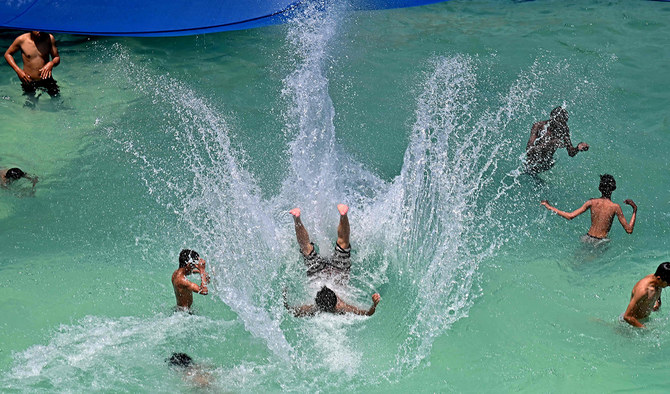ISLAMABAD: Global action is urgently needed as a series of extreme heatwaves in Pakistan wreak havoc on human rights, Amnesty International said in its new report ‘A Burning Emergency: Extreme heat and the right to health in Pakistan,’ released on Monday to coincide with World Environment Day.
The document examines the impacts of extreme heat in Pakistan on people’s lives and right to health and livelihoods, and highlights the struggles of people living in poverty in some of the hottest cities in the world.
“Pakistan is on the frontline of the climate crisis,” said Dinushika Dissanayake, Amnesty International’s Deputy Regional Director in South Asia.
“Climate injustice is starkly visible, with its people facing disproportionately severe consequences, often life threatening, despite their small contribution to climate change. Tackling a climate crisis of this scale requires global attention and action. Wealthier countries must make no mistake about the important role they play.”
“On World Environment Day, we hope our report serves as a reminder of our collective responsibility towards some of the most marginalized people exposed to extreme temperatures,” Dissanayake said.
“They are being forced to live in torrid conditions, as these searing temperatures rise every year while we idly let time go by. Without further delay, wealthier countries must demonstrate a decisive commitment to reduce emissions, rapidly phase out fossil fuels and provide funds to support people to adapt and quickly operationalize the Loss and Damage fund established at COP27.”
The report calls on the government in Pakistan to develop comprehensive heat action plans consistent with human rights law and standards, and to ensure that the rights of groups that are especially vulnerable to the health impacts of extreme heat are protected.
The report is based on in-person interviews with 45 people who experienced the adverse impacts of extreme heat during the summer months of 2021 and 2022 in Jacobabad and Lahore in Pakistan.
Jacobabad is one of the hottest places on the planet. In June 2021, its highest recorded temperature reached an unbearable 52°C.
Amnesty International interviewed people at higher risk of exposure to heat, including agricultural workers, labourers in brick kiln factories, delivery riders, police officers, sanitation workers and others in outdoor work.
Health workers interviewed in Jacobabad and Lahore reported seeing increases in heatstroke, drowsiness, difficulty breathing, burning sensations in the stomach, dizziness, fever, body pain, eye infections, and headaches during periods of extreme heat.
“In May and June, many patients came to us because of the heatwave… Daily, we would receive 50-60 cases in the emergency department,” a health worker told Amnesty in Lahore.
Amnesty said its interviews revealed that while the impact of extreme heat is felt by everyone, some are much worse off because of their socio-economic status.
“We are more vulnerable to heat than anyone else. Hot weather impacts poor people. There is no escape for us,” a woman living in an informal settlement in Jacobabad said.
Day-wage workers that Amnesty International interviewed said that they had no choice but to continue working even if they feel hot, despite the health guidelines to stay indoors during periods of extreme heat.
A tractor driver in Jacobabad said: “If we take a break there is no daily wage… because of poverty, we have to work no matter the weather.”
People such as those living in poverty and working in the informal sector with precarious work, lower incomes and fewer opportunities for rest and shade, with limited or no access to support, are severely impacted by the extreme temperatures. Furthermore, multi-layered and intersecting forms of discrimination against women also undermine their ability to cope in heat waves, which has potentially dangerous implications for their health and that of their children.
Despite the searing temperatures in Jacobabad and Lahore, neither city has a heat action plan or climate-responsive social protection mechanisms in place. In Pakistan, more than 40 million people do not have access to electricity. Others have erratic and irregular supplies. People living in poverty do not have access to, or are unable to afford, electricity for fans or air conditioning units and neither can they afford to buy solar panels.
A lot of the public health advice on avoiding exposure to heat presupposes that people can afford to stay indoors, negotiate different working hours, access adequate water, healthcare and cooling mechanisms, Amnesty said.
“Well-designed and well-resourced social protection programmes can help mitigate some of the worst impacts of climate change as crisis upon crisis hits Pakistan,” said Dissanayake.
Amnesty International’s report sets out a comprehensive list of recommendations for the government in Pakistan and the international community. They include calling for the Pakistan authorities to conduct a needs assessment in the context of heatwaves, focusing on – and with the participation of – the most marginalized people, preparing and implementing human rights compliant heat action plans, and providing effective social protection in order to support people in coping with heatwaves.
“It is crucial that the wealthy states most responsible for the climate crisis provide funds to support not just adaptation but also remedy for the loss and damage people have experienced or will experience because of extreme heatwaves fueled by climate change in countries such as Pakistan,” said Dissanayake.
“This report tells us the story of the devastation that is following the unmitigated and irresponsible actions of governments, particularly the wealthy nations and others that are opposing a rapid and just transition away from fossil fuels. They must ensure human rights harms are not irreversible and work towards achieving climate justice in accordance with their human rights obligations.”












